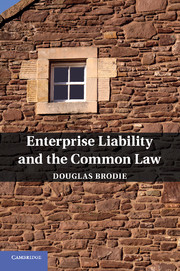Book contents
- Frontmatter
- Contents
- Preface
- Abbreviations
- 1 Introduction
- 2 The reception of Bazley v Curry
- 3 Enterprise risk
- 4 The risk and the individual
- 5 The enterprise
- 6 The borrowed employee
- 7 Independent contractors
- 8 Transferring the burden: the employer's right of indemnity
- 9 Risk and the employment relationship
- 10 Enforcement of the employment contract
- 11 Enterprise liability and non-delegable duties
- 12 Fundamental obligations
- 13 Concluding remarks
- Index
11 - Enterprise liability and non-delegable duties
Published online by Cambridge University Press: 17 November 2010
- Frontmatter
- Contents
- Preface
- Abbreviations
- 1 Introduction
- 2 The reception of Bazley v Curry
- 3 Enterprise risk
- 4 The risk and the individual
- 5 The enterprise
- 6 The borrowed employee
- 7 Independent contractors
- 8 Transferring the burden: the employer's right of indemnity
- 9 Risk and the employment relationship
- 10 Enforcement of the employment contract
- 11 Enterprise liability and non-delegable duties
- 12 Fundamental obligations
- 13 Concluding remarks
- Index
Summary
Within the law of tort non-delegable duties have long given rise to controversy and strong criticism. Fleming noted ‘the apparent absence of any coherent theory to explain when, and why, a particular duty should be so classified; and it has been questioned whether the resulting uncertainty and complexity of the law is matched by any corresponding advantages’. Irrespective of whether the criticism is justified the concept is unusual within the common law of tort in that it is a form of strict liability. It also is at odds with the law's general approach to delegation which is to facilitate it. For example, the law does not tend to place barriers in the path of hiring an independent contractor. Employers frequently need to engage the services of a third party where performance of a task calls for some skill or experience which the employer does not possess. The courts are cognisant of the fact that economic activity is hugely interdependent. The law is normally willing to rest content on the basis that reasonable care over selection has taken place. The High Court of Australia has pointed out that, on occasion, it may be difficult to see how the obligation of reasonable care could be discharged in the absence of delegation: ‘In many cases (although not in this) the independent contractor will have been engaged by the roads authority precisely because it enjoys technical expertise or a special capacity which would make the interference of the roads authority completely inappropriate – at least as a general rule.
- Type
- Chapter
- Information
- Enterprise Liability and the Common Law , pp. 149 - 164Publisher: Cambridge University PressPrint publication year: 2010



